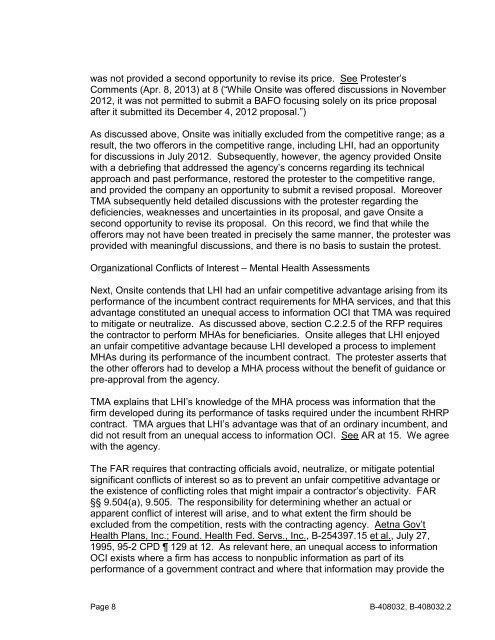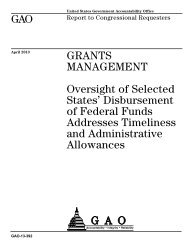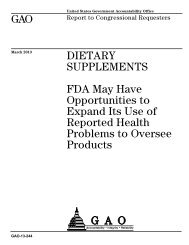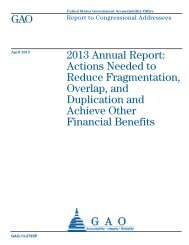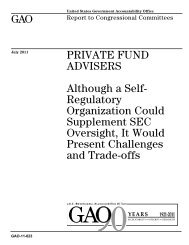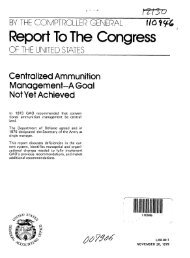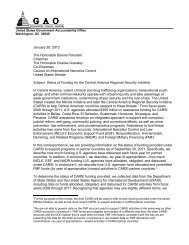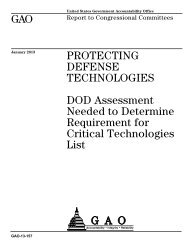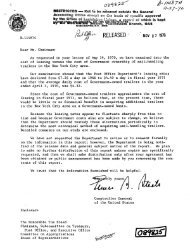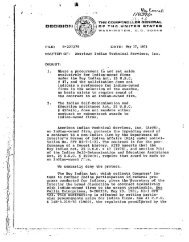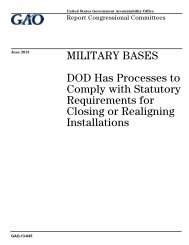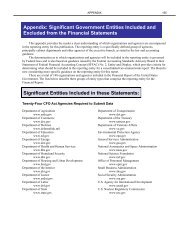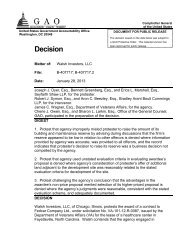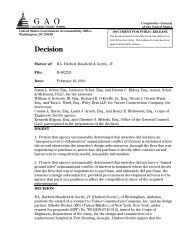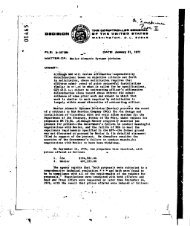View Decision (PDF, 11 pages) - US Government Accountability Office
View Decision (PDF, 11 pages) - US Government Accountability Office
View Decision (PDF, 11 pages) - US Government Accountability Office
Create successful ePaper yourself
Turn your PDF publications into a flip-book with our unique Google optimized e-Paper software.
was not provided a second opportunity to revise its price. See Protester’s<br />
Comments (Apr. 8, 2013) at 8 (“While Onsite was offered discussions in November<br />
2012, it was not permitted to submit a BAFO focusing solely on its price proposal<br />
after it submitted its December 4, 2012 proposal.”)<br />
As discussed above, Onsite was initially excluded from the competitive range; as a<br />
result, the two offerors in the competitive range, including LHI, had an opportunity<br />
for discussions in July 2012. Subsequently, however, the agency provided Onsite<br />
with a debriefing that addressed the agency’s concerns regarding its technical<br />
approach and past performance, restored the protester to the competitive range,<br />
and provided the company an opportunity to submit a revised proposal. Moreover<br />
TMA subsequently held detailed discussions with the protester regarding the<br />
deficiencies, weaknesses and uncertainties in its proposal, and gave Onsite a<br />
second opportunity to revise its proposal. On this record, we find that while the<br />
offerors may not have been treated in precisely the same manner, the protester was<br />
provided with meaningful discussions, and there is no basis to sustain the protest.<br />
Organizational Conflicts of Interest – Mental Health Assessments<br />
Next, Onsite contends that LHI had an unfair competitive advantage arising from its<br />
performance of the incumbent contract requirements for MHA services, and that this<br />
advantage constituted an unequal access to information OCI that TMA was required<br />
to mitigate or neutralize. As discussed above, section C.2.2.5 of the RFP requires<br />
the contractor to perform MHAs for beneficiaries. Onsite alleges that LHI enjoyed<br />
an unfair competitive advantage because LHI developed a process to implement<br />
MHAs during its performance of the incumbent contract. The protester asserts that<br />
the other offerors had to develop a MHA process without the benefit of guidance or<br />
pre-approval from the agency.<br />
TMA explains that LHI’s knowledge of the MHA process was information that the<br />
firm developed during its performance of tasks required under the incumbent RHRP<br />
contract. TMA argues that LHI’s advantage was that of an ordinary incumbent, and<br />
did not result from an unequal access to information OCI. See AR at 15. We agree<br />
with the agency.<br />
The FAR requires that contracting officials avoid, neutralize, or mitigate potential<br />
significant conflicts of interest so as to prevent an unfair competitive advantage or<br />
the existence of conflicting roles that might impair a contractor’s objectivity. FAR<br />
§§ 9.504(a), 9.505. The responsibility for determining whether an actual or<br />
apparent conflict of interest will arise, and to what extent the firm should be<br />
excluded from the competition, rests with the contracting agency. Aetna Gov’t<br />
Health Plans, Inc.; Found. Health Fed. Servs., Inc., B-254397.15 et al., July 27,<br />
1995, 95-2 CPD 129 at 12. As relevant here, an unequal access to information<br />
OCI exists where a firm has access to nonpublic information as part of its<br />
performance of a government contract and where that information may provide the<br />
Page 8<br />
B-408032, B-408032.2


